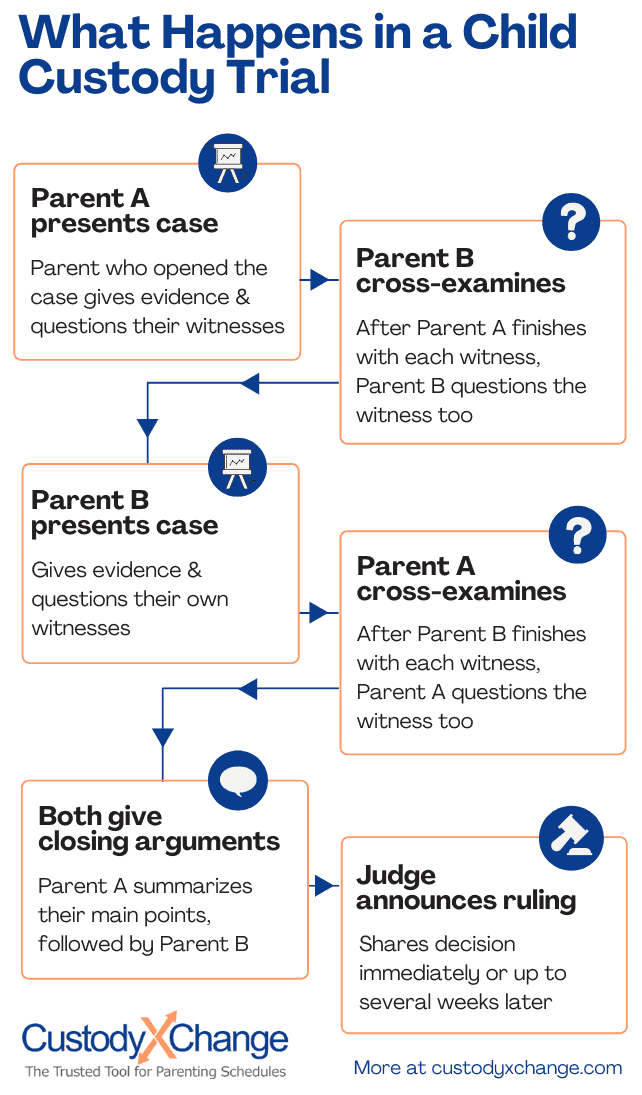Tennessee Child Custody Trials: What to Expect
If you're unable to reach a settlement after filing a case, you'll end up in a trial. During trial, the parties present arguments and evidence so the judge can issue a final custody order.
Divorce and separation trials may address custody and noncustody issues on separate days.
Procedures may vary by case, county and judge.
Preparing for trial
If you have an attorney, they will make sure you're prepared. If you're on your own, focus on each individual argument you'll present in court; then prove it with evidence.
Evidence may include:
- Family schedules (e.g., school and work)
- A calendar showing the time you've spent with the child
- Entries from a parenting journal
- Expense reports
- Proof of income
- Records of conversations with the other parent
- Witness testimony
Confirm that everything you will present follows Tennessee's Rules of Evidence.
Witnesses must have first-hand knowledge of what they're testifying to. They should be prepared to tell the truth and answer questions from the other side.
Much of trial preparation occurs during discovery when the parties request and exchange information relevant to the case.
Scheduling and timing
You will usually wait about four months for trial to begin after opening a case. In a divorce or separation, the trial can't start until the case has been on file for 90 days.
Before reserving trial days, the judge may ask the parties how much time they'll need to present their cases. There may be days or even weeks between trial sessions.
A full day of trial lasts eight hours. Trials that deal solely with custody can often resolve in half a day. Divorce and separation can take up to three days if the litigants have a lot of possessions and finances to divide.
Procedures
A judge presides over divorce and separation trials. In juvenile court, a magistrate may hear and decide a custody-only case in place of a judge.
Attorneys give statements, speak to the judge, question witnesses and present evidence on their client's behalf. Parents without attorneys must do all this on their own.
After the judge briefly explains procedures, the parent who opened the case (called the plaintiff) makes an opening statement to set up what they'll present to the court.
Then, the plaintiff takes the stand for questioning by their attorney. If self-represented, the plaintiff gives testimony as a short speech. (Some judges call the defendant to make an opening statement and take the stand after this.)
Next, the plaintiff questions witnesses and presents evidence.
The defendant then has the chance to question the plaintiff and the witnesses that testified. The defendant's goal is to find inconsistencies or inaccuracies in the testimony.
Afterward, the plaintiff may question their witnesses again to clarify anything that may have been misconstrued.
Once this questioning ends, the defendant follows the same process as above, starting with an opening statement (if they haven't already given one).

If the case involves a guardian ad litem, they may also question parents and witnesses and present evidence on the child's behalf.
At the end, each party gives a closing statement to summarize their main points.
Often, children 12 and older have a private interview with the judge on nontrial day. While a parent can request that their child testify in court, this is not recommended, as it can be emotionally taxing on the child
Generally, the shorter the trial, the quicker the judgment. The judge could make a decision the day trial ends or take a few days to deliberate and then call parents back to court to announce the verdict. Either way, parents receive a copy of the final order in the mail.
A parent can request a modification of the order anytime after it's issued. If you believe there was a legal error, you can appeal to a higher court.
Tips
- Wear business casual dress (no t-shirts, sandals, flip flops or ripped clothing).
- Arrive early to allow yourself time to check in and find the courtroom.
- Treat everyone, including court employees and the other party, with respect.
- Only speak when asked to.
- Speak clearly, and don't rush.
- Don't start arguments with the other party; the court is not the place to vent frustrations.
- Don't let personal issues with the other parent interfere with what's best for your child.
- Avoid getting overly emotional, especially when the judge announces their decision.
Staying organized
Going to trial over child custody requires serious organization.
You'll need to present evidence, which could range from messages with the other parent to a calendar showing when you care for your child. You should also present a proposed parenting plan and schedule to the court.
The Custody X Change app lets you create and manage all of these elements in one place.

You can customize this to fit your situation with Custody X Change.
With parent-to-parent messaging, personalized custody calendars, a parenting plan template and more, Custody X Change makes sure you're prepared not only for trial but for every step of your case.
Take advantage of our technology to get what's best for your children.
